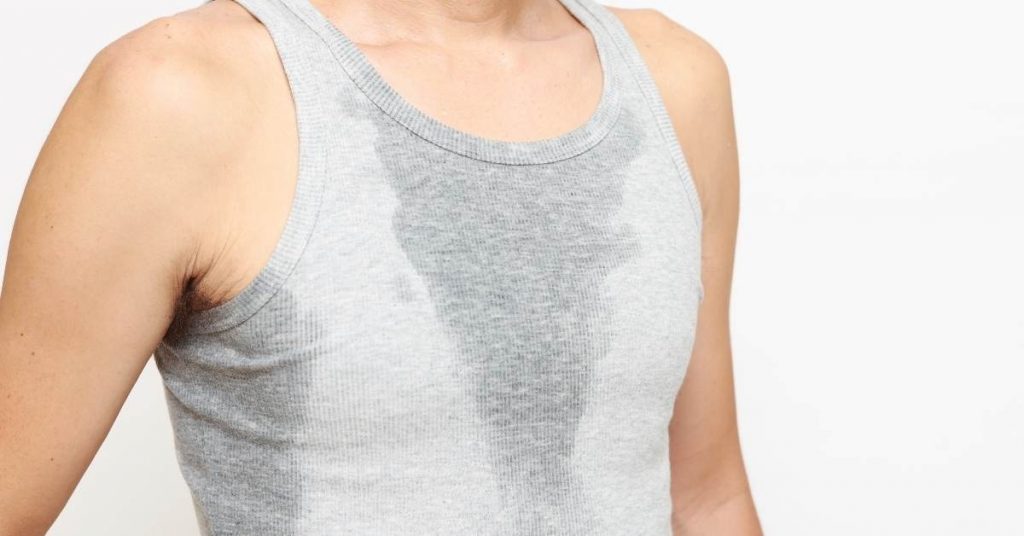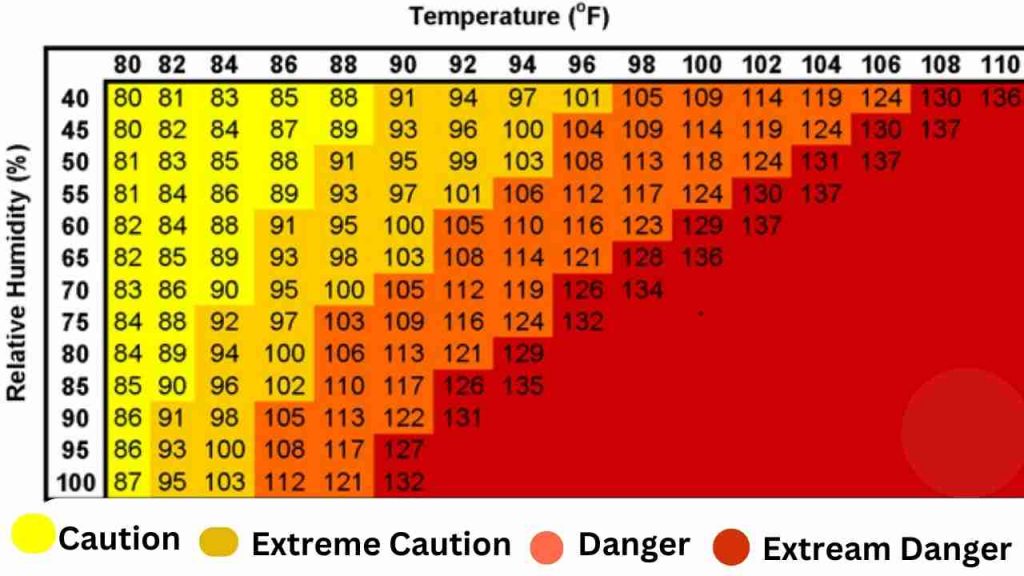
Humidity plays a crucial role in how we perceive temperature and can make it feel hotter than it actually is due to several interconnected factors. In summary:
- Humidity and Sweat: When the air is humid, it contains a higher concentration of water vapor. This makes it more difficult for sweat to evaporate from our skin. Sweat is our body’s natural cooling mechanism; it absorbs heat and evaporates to cool us down. In humid conditions, this process is less efficient, making us feel hotter and stickier.
- Heat Index: Meteorologists use a metric called the heat index or “feels like” temperature to account for the combined effects of temperature and humidity on the human body. This index considers how our bodies perceive temperature, taking into account the reduced cooling ability in humid conditions. As humidity rises, the heat index can significantly exceed the actual temperature, making it feel much hotter than it really is.
- Body’s Cooling Mechanism: Our bodies rely on the evaporation of sweat to maintain a stable temperature. High humidity hampers this process by slowing down the rate of evaporation. As a result, our bodies struggle to dissipate excess heat effectively, leading to an elevated perception of temperature.
- Respiration and Discomfort: Humid air can also affect our respiratory system. Breathing in humid conditions can be more challenging, and it may feel like the air is “heavy.” This discomfort can add to the perception of heat and make it more difficult for the body to cool itself through respiration.
- Psychological Impact: High humidity can create a psychological feeling of discomfort. When the air is muggy and sticky, people often perceive the temperature as hotter than it actually is. This perception can lead to increased stress and discomfort, further exaggerating the sensation of heat.
What is Humidity?

Simply put, humidity refers to the water vapor in the air. Humidity is not constant. It keeps changing as temperature changes and also varies from region to region.
Humidity is expressed in 2 terms:
- Relative humidity
- Absolute humidity
Absolute humidity is the amount of water vapor (mass) in a given volume of air, expressed in grams of air per cubic meter of air. It simply tells us how many grams of water vapor are present in a certain volume of air.
Relative humidity is the amount of water vapor in the air, expressed as a percentage of the total amount of water that the air can hold at that temperature. Relative humidity is therefore greatly affected by temperature.
Hot air can take up more water than cold air. That is why relative humidity is high during summer and low during winter.
It is however important to mention that even hot air can only take so much water. At some point the air will fail to take up more water since it will be saturated. And that is exactly why it feels so hot during the summer when relative humidity is high.
To demonstrate this I will use 2 locations in the United States: Florida and Arizona. The average relative humidity in Florida is 74% while that of Arizona is 38.5%.
During summer, while both states will be hot, the heat in Arizona will feel more bearable than the heat in Florida. Why is that though?
At 38.5% relative humidity, the air in Arizona is dryer than that in Florida. That means that Arizona air will effortless evaporate sweat from a human’s skin unlike the air in Florida which is already saturated with moisture.
The hot air in Arizona will therefore feel cooler than the hot air in Florida.
How Sweating Cools Our Bodies
To understand how sweating cools our bodies and how high humidity prevents that from happening, think about how an air conditioner cools indoor air in our house.
Cooling happens on the surface of the evaporator coil also known as the AC indoor unit. Inside the evaporator coil is the refrigerant (Freon) in its liquid state. The refrigerant needs to have a low boiling point and high latent heat of vaporization.
When the fan pulls warm air from the house, the refrigerant absorbs heat from the air and turns from liquid to gas. To turn the refrigerant from liquid to gas, the refrigerant needs to be supplied with heat.
The heat is supplied by the indoor air. As the refrigerant evaporates, it takes away with it heat from the indoor air. That is how an AC cools your house.
Note: And because cold air holds less water than hot air, condensation takes place on the coil’s surface. That is how ACs are also used for dehumidification
Similarly, your body releases sweat through the pores on the skin as a liquid. In order for the liquid to evaporate and cool the body, heat needs to evaporate the sweat into vapor.
Sweat takes up heat from the surrounding in order to vaporize and that is how the body is cooled. It is also the reason why dogs stick their tongue out when its hot.
While heat is not a problem in the summer, the vapor has to go somewhere. If the air contains so much vapor (high humidity) that it won’t take up any more water, the sweat will just not evaporate.
As a result, the sweat will remain on our skins and that is exactly why our bodies feel sticky during the summer which contributes to the general discomfort that comes with high humidity.
Why Humidity is Higher in Some States than in Others
Have you ever wondered why relative humidity is higher in some areas than in others? The reason behind it is actually very straightforward.
Relative humidity is usually as a result of evaporation. Water evaporates from water bodies and saturates the air in the land close to it.
Relative humidity in a city Like Miami is quite high since it is a Coastal city. Water vapor from the sea evaporates especially during the summer and that is why relative humidity there is quite high.
Now compare Miami with Las Vegas. Las Vegas is so far from water bodies and as a result its air is hot and dry. The relative humidity in Las Vegas is one of the lowest in the US.
It is not surprising that the effects of high relative humidity are the exact opposite effects of low humidity.
Humid states struggle with high relative humidity during the summer while such is not a bother for states with low humidity. However, when winter kicks in, low humidity becomes a problem for folks in arid states.
Low humidity makes it feel colder that it actually is. That is because the dry air pulls away the moisture from your skin hence exposing your body to the elements.
When the relative humidity is ideal, the skin retains its moisture which helps to regulate the body’s temperature. Pulling the moisture away from the skin create a cooling effect on the skin and that is why it feels colder than it actually is.
Heat Index: Actual vs Apparent Temperature
Think about the following:
- At 70% relative humidity, 85 degrees feels like 93 degrees
- At 80% relative humidity, 85 degrees feels like 97 degrees
- At 30% relative humidity, 85 degrees feels like 84 degrees
- At 10% relative humidity, 85 degrees feels like 80 degrees
As you can see, the higher the relative humidity is the hotter it feels. Again, high relative humidity means a high concentration of moisture in the air, and the less likely the air is to take up sweat from your skin.
The heat index or apparent temperature is what the temperature feels like to the human body as opposed to the actual temperature. It is also known as “feels like temperature”.
Heat index is considered dangerous when it exceed 1030 F. If you would like to check out the heat index in your areas, there is a formula to get there, or you can just use the relative humidity chart below.

Ways to Lower Indoor Humidity
The following are some of the ways to reduce indoor humidity to acceptable levels:
- Use a dehumidifier
- Properly size your AC unit
- Set the AC fan to AUTO
- schedule regular AC maintenance
- Use vapor barrier in the crawlspace
- Fix water leaks
- Close crawlspace vents
- Ensure AC drip pan is level (water is not pooling inside)
- Use a basket of charcoal briquettes
- consider a rock salt dehumidifier
- line dry your clothes outside
- use bathroom and kitchen exhaust fans
- take cold showers
